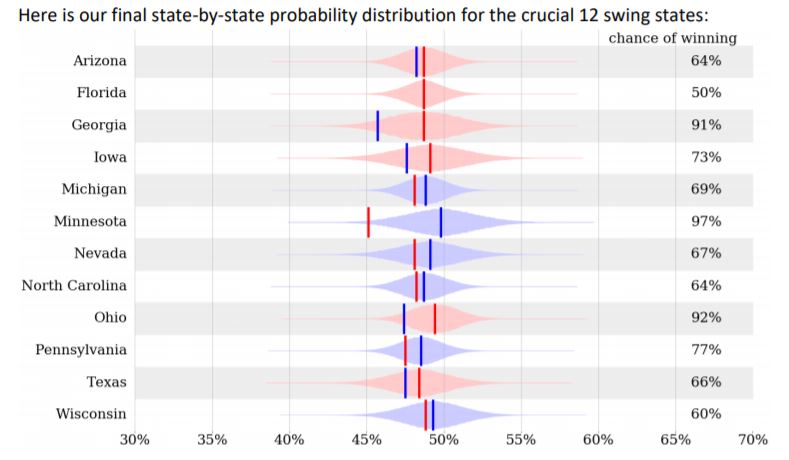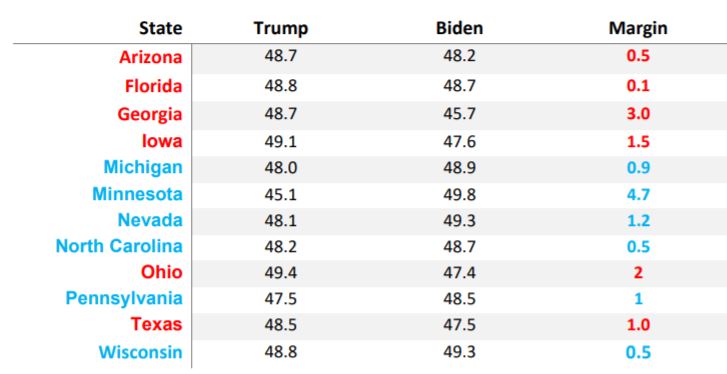Transparency, the Biggest Winner in the 2021 Croatian Local Elections?
May 27, 2021 - The first round of the 2021 Croatian local elections brought a strong breeze of change to the country, with one clear winner - transparency.
I must confess that I am looking forward to Monday morning. Apart from the fact that I will be back in court for the first hearing of one of my two lawsuits from the Croatian National Tourist Board (which I am secretly quite enjoying, but don't tell anyone), it will also be the day after the second round of voting in the Croatian local elections.
The Croatian obsession of treating even minor politician as rock stars is a source of endless fascination to me. Ask the average Brit to name, reconise and know the position of 10 politicians, and you will struggle. Not so in Croatia. Even though we do not talk politics at home, my daughters knew the mayors of Jelsa, Split and Zagreb, Karamarko, Oreskovic, Kosor, Plenkovic, Milanovic, Sanader and probably a few others. While at kindergarten age.
The negativity of campaigning is on the rise globally, but things are always fairly murky in the Balkans.But are things changing a little? Is there some hope for Hrvatska, as that gentle Croatia 2.0 breeze of change gathers strength? If, as expected, the frontrunners for Sunday's run-off in Split and Zagreb prevail, this will be a huge gust of wind blowing in the direction of a better future for our children.
But it is not just in the big cities.
I have been meaning to write this post for a while, but TC and Dubrovnik nomads have kept me busy. After the first round of elections on May 16, I posted this on my Facebook profile:
Although I don't pretend to understand all the nuances of Croatian local politics, a very interesting night at the polls. A brighter dawn for Zagreb for sure, and the success of young Ivica Puljak in Split is truly inspiring.
Can change come to Croatia? Look no further than Sveta Nedelja and compare the vote to 4 years ago. Even without Rimac, Holy Sunday is flying. Thanks to the leadership of Dario Zurovec and his team, jobs are up 20%, population has increased by 10% it has been named the top medium-sized Croatian town for the economy for the last 3 years in a row, as well as in the top 5 for quality of life.
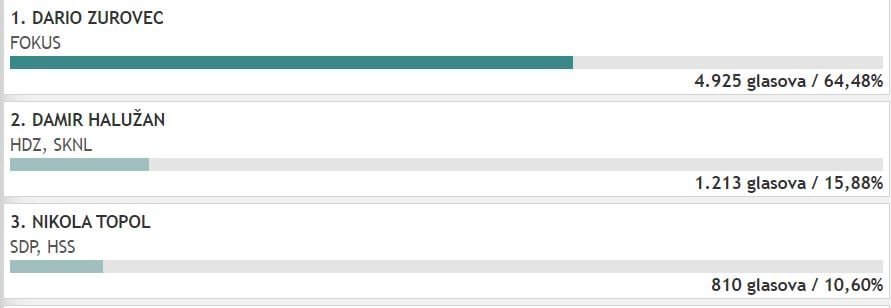
And the voters seem to like it. A staggering 42% increase in the vote for young Zurovec, from 22% in 2017 to 64% this time around. A tiny case study of how to bring change to Croatia in just 4 years.
Just as the Croatian National Tourist Board is an irrelevant institution, so too the old politics of corruption and cronyism. I must admit. I am loving this gentle breeze of change, which is slowly gathering pace by the day. Go Croatia 2.0!
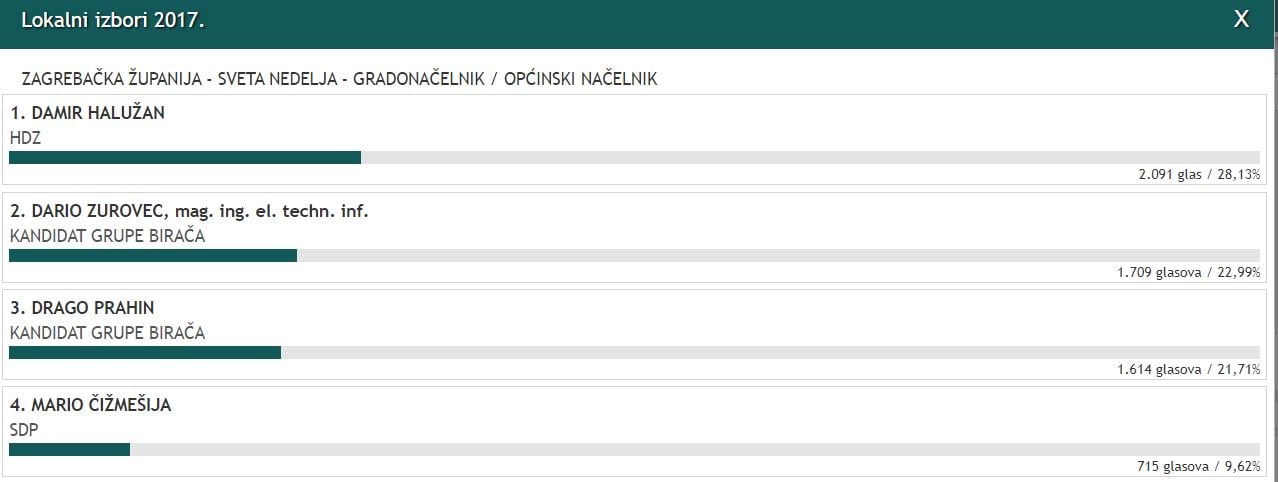
It seems that Sveta Nedelja was not alone. Transparency legend and Croatian brainbox Vuk Vukovic has been working with various local authorities to introduce transparency into local administration. And he had a rather interesting Facebook update of his own:
Transparency pays off ?
In the cities and municipalities that have introduced (or are introducing) our version of full budget transparency, their (city) mayors are each at over 60% in the first round.
Hrebak, Bjelovar - 66.8%
Ahmetovic, Omisalj - 63.5%
Petrina, Primosten - 70.3%
Bilic, Trogir - 63.6%
Ok, they would all get it probably without transparency, there are a lot of other projects and merits, but if it helped them a little, it's good!
Congratulations to the cities that have a transparent public procurement register (which is also certainly a step in the right direction), such as Sveta Nedelja and Zlatar, and their mayors at over 60% in the first round. Again, thanks to great other projects, but it's nice that voters honor this topic as well.
And I am also glad that the candidates in other cities who announced transparency were awarded, and those who faked transparency, ie offered a false promise, were punished (such as Pavičić-Vukičević and Filipović in Zagreb).
Everything is great.
There must be a message in there somewhere. Could it be that when people decide to vote for a better future for their children rather than the nepotism of the past, they see that Croatia moves forward, and their lives are better as a result? And then they want more of it?
Looking forward to a cleansing bura on Sunday night and then focusing on fresh beginnings on Monday. The twin viruses of technology and transparency are here to stay.
Pesja in Omišalj Becomes First Fully Transparent Public Company in Croatia
April 16, 2021 - Utility company Pesja in Omišalj operates fully transparently thanks to cooperation with the company Oraclum, owned by famous Croatian economist Vuk Vukovic.
Index.hr reports that from today, it will be possible to see all payments from the business account of KD Pesja d.o.o.
Pesja, founded by the Municipality of Omišalj, becomes the first utility company in Croatia that will provide citizens with insight into every transaction, i.e., payments to legal entities and individuals, providing citizens with their work and all data on how public money is spent.
Pesja thus sets an example to other utility companies, but also to other institutions established by regional and local self-government units which, by introducing transparency, prevent corrupt actions and inefficient spending of public money.
Mirela Ahmetović, the mayor of Omišalj, says that she is proud that in the fight against corruption in Croatia, the utility company from her municipality is introducing full transparency.
"The municipality of Omišalj continues to introduce full transparency of public money and sets an example to all other local governments to act in the same way to be one step closer to combating corruption that eats away at Croatian society. We were the first municipality to show every penny of taxpayers' money completely and without hidden intentions.
No matter how small the Municipality of Omišalj is in the eyes of the rest of the country, we have shown by our example that even the smallest can become an example to the biggest and that we do not give up on a better and fairer system that serves only those who pay - citizens.
We are proud to be the first in Croatia in the fight against corruption. Pesja is the first utility company in the Republic of Croatia to show all its costs fully. Also, we will introduce transparency in the Municipality of Omišalj Tourist Board and thus complete this story. We will show the citizens how the public money of all companies and organizations established by the Municipality of Omišalj is spent.
It is a way to fight corruption at all levels and a clear message to all residents of the municipality of Omišalj that their money is safe and that no one should betray their trust. I want the whole of Croatia, all local self-government units, and especially state administration bodies and public companies to take such a position. I am convinced that Croatia would become a happier and better country with this political decision," she said.
Goran Ivandić, director of KD Pesja, emphasizes the hope that their example will be followed by other companies, institutions, and other entities.
"By introducing a system for transparency in our utility company, all payments from our business account are visible. Considering that the largest part of the income comes from the provision of communal services that we contractually perform for the Municipality of Omišalj, we use the link on our website to transparently provide insight into taxpayers' spending money. Thus, Pesja became the first company to decide on this step of full transparency. Still, we hope that our example will be followed by other companies, institutions, and all other entities financed from the budget to increase their responsibility to citizens and reduce the possibility for corruption," Ivandic said.
Famous economist Vuk Vukovic praised the Municipality of Omišalj.
"Once again, the Municipality of Omišalj is in the right light because soon after full transparency of its own budget, it started to include all other legal entities under its jurisdiction. Thus, it was the turn of the utility company Pesja d.o.o., the first in Croatia to present absolutely all the costs of their expenses. It is important to note the importance of this move.
So far, we have had only a few examples of complete transparency of the budgets of cities and municipalities, and in some places, presentations of public procurement of public companies. Pesja is the first public company in Croatia to show those costs that do not pass public procurement, i.e., which are below the procurement threshold, as well as all salaries of employees who gave their GDPR consent, also in the desire for full transparency and who really do not have what to hide.
As with the Municipality itself, citizens will be able to view each cost, each contract, and all employees' salaries via a link on the website, which puts the business of this public company under the watchful eye of the public. Pesja and Omišalj are now becoming an example to the rest of Croatia of how to approach full transparency projects," Vukovic said.
To read more about business in Croatia, follow TCN's dedicated page.
Vuk Vukovic's Analysis Reveals Worrisome Data on Vulnerable Croatian Companies
As Marko Repecki/Telegram writes on the 14th of December, 2020, if almost 7,000 vulnerable companies fail (according to the data from August, they're now even more endangered than they were before with this new lockdown), the Croatian state budget will lack a massive 3 billion kuna, which is equivalent to funds for as many as 130,000 pensions, according to the Voice of Entrepreneurs Association (Glas Poduzetnika). Economist and head of the Economic Council of the Voice of Entrepreneurs, Vuk Vukovic, analysed the effect of the collapse of vulnerable companies on the state budget.
The aforementioned association has been warning that micro, small and medium-sized enterprises will unfortunately be the ones to bear the brunt of the ongoing coronavirus crisis and that many of them will have to close their doors due to the lack of concrete assistance.
About 500,000 workers were affected by the measures
Vuk Vukovic's analysis is based on data on aid for job preservation from the Croatian Employment Service (CES), which is presented by month, and on data on the financial statements of all Croatian companies from back in pre-pandemic 2019.
Table 1 and Graph 1 indicate several interesting trends. First, during the lockdown (from March to the end of May), between 415 and 500 thousand workers were affected by the then introduced measures. This regards employees who, at least at that time, depended on state aid of 4,000 kuna because they weren't able to work (their companies were closed or they were in isolation).
In 2019, they generated 419 billion kuna in revenue
A total of 55 thousand companies were, at one time, dependent on this type of assistance. It's worth pointing out that these companies generated a total of 419 billion kuna in revenue in 2019, which is more than the Croatian GDP from that year (which amounted to about 400 billion kuna) and represents 52 percent of the total revenue earned by all Croatian companies in 2019. Half of the Croatian economy was directly affected by the crisis caused by the COVID-19 pandemic.
"This doesn't mean that 419 billion kuna in revenue was endangered because not all revenues fell by more than 50 percent, some actually fell by much less, but in those months, many companies asked for support,'' explained Vuk Vukovic.
After the lockdown, there was a drop in the number of people provided with the aforementioned grants
Interestingly, after the lockdown, there was a sharp drop in the number of people using those government subsidies, from 415 thousand down to a significantly lower 72 thousand in June, and from 54 thousand companies to 6800 who were still seeking such support for their 49 thousand workers during the month of August. These companies, which were obviously still sailing through troubled waters three months after the lockdown and as such needed to seek 4,000 kuna in aid for their workers, account for a total of almost 37 billion kuna in revenue (9 percent of GDP).
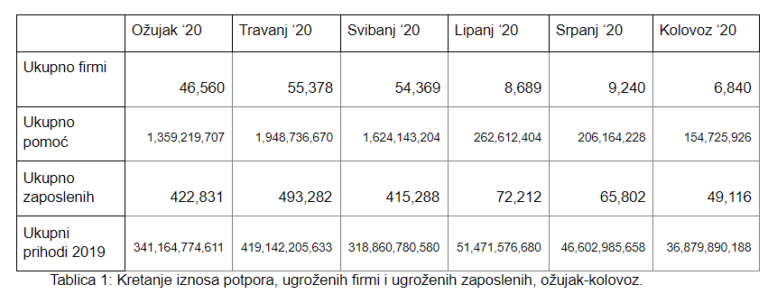
In other words, the collapse of these companies, which haven't yet recovered from the shock of this continuing crisis, directly threatens 49 thousand jobs and 9 perent of GDP (this data refers to the period before the new, partial lockdown came into force).
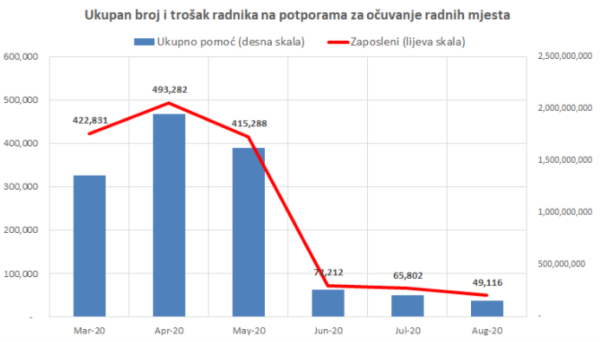
The next category is the data on paid taxes and contributions of micro, small and medium enterprises registered in Croatia. Table and Graph 2 show the distribution of income tax payments and taxes and contributions from salaries and employee salaries for all companies in Croatia for the year 2019.
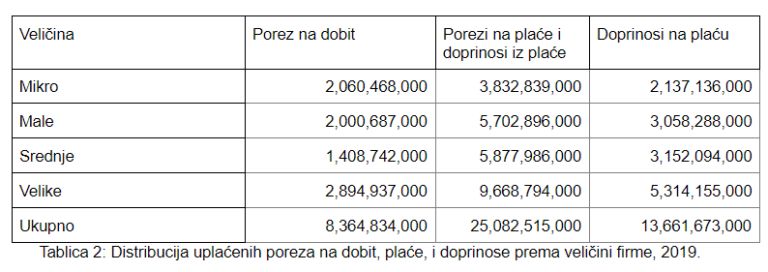
They paid 29.2 billion kuna in taxes and contributions last year
Back in 2019, micro, small and medium-sized (SME) companies in Croatia paid a total of 5.5 billion kuna through profit tax and 23.7 billion kuna through taxes on salaries and contributions. This total amount, excluding VAT, of as much as 29.2 billion kuna, was enough to cover the total costs of the healthcare system in 2019, which stood at around 12.8 billion kuna, the police, court and prison costs (8.8 billion kuna), military expenditures (4.7 billion kuna) and even expenditures on sports, religion and culture (an additional 2.6 billion kuna).
Or, a different calculation of 29.2 billion kuna collected only from micro, small and medium enterprises would show that it was enough to finance the total cost of pensions of 27.4 billion kuna, or to almost cover the total cost of expenditures for public sector employees, which in 2019 amounted to 29.6 billion kuna.
A ''hole'' of 3 billion kuna has been formed through a drop in the payment of taxes and contributions alone
Micro, small and medium-sized Croatian enterprises pay the state budget an amount sufficient to finance all pensions or all salaries in the public sector or the entire healthcare system, the police, courts and prisons, the army, sports, religion and culture. If we focus solely on those Croatian companies that received aid, whose revenues at the height of the pandemic and lockdown accounted for 52.5 percent of that of the Croatian economy, such companies paid about 24 billion kuna from income tax and taxes and contributions to salaries (excluding VAT) for 2019 alone.
After the lockdown came to an end, far fewer companies were left at risk, but their potential collapse will create a hole of as much as 3 billion kuna just through the drop in taxes and contributions to the state budget. This effect of the collapse of about 7,000 of the most vulnerable companies alone means less money for the healthcare system, pensions or for public sector wages. In particular, the collapse of the 7,000 most vulnerable companies would jeopardise as many as 136,000 pensions or about 25,000 salaries in the public sector.
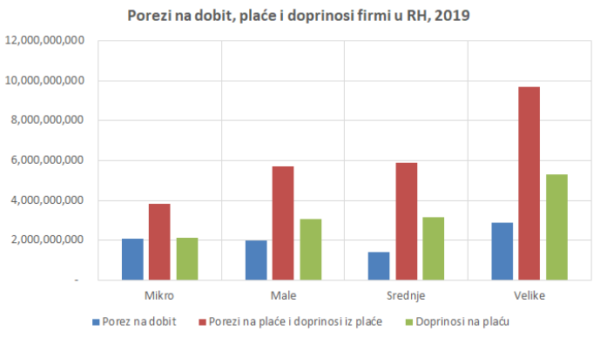
Vuk Vukovic: The government needs to find a way to save these companies
''It should be borne in mind that this is an impact assessment based solely on the latest data available from the end of August. At the end of the year, after the new lockdown, even more Croatian companies are likely to find themselves in troubled waters, which means that many more jobs are potentially yet to be put at risk, and as such, tax revenues and budget contributions will also be in the same boat.
I'd like to note that these calculations don't take into account the lack of VAT revenue from companies that will potentially fail and whose staff would find themselves out of work. Thus, all of the above estimates very likely underestimate the strength of the final effects of all this. I think that the situation is very serious and that the government should find ways to prevent the collapse of so many companies as soon as possible,'' concluded Vuk Vukovic, the founder of the Economic Council of the Glas Poduzetnika Association.
For the latest travel info, bookmark our main travel info article, which is updated daily.
Read the Croatian Travel Update in your language - now available in 24 languages
Pollster Oraclum Called Trump 2016, Brexit, Narrow Biden 2020, Comments on Electoral Fraud
November 10, 2020 - Who to believe about the US election results and the allegations of fraud? Meet Oraclum, the Croatian pollster who correctly called Trump in 2016 and a narrow Biden win in 2020, including the chaos which followed.
I learned a LOT about American geography last week.
Give me a map of America and I could probably have placed about 15 states in their correct place. After last week, I know exactly where the Blue Wall is, the neighbours of Nevada and Arizona, and Georgia is on my mind.
I also learned a lot about the US media and the US on social media. Moving between Fox News, CNN and Breitbart was as entertaining as it was scary - were we all watching the same election?
Social media was even more brutal. The conspiracy theorists were out in force, the accusations, the hate, the total division of a nation on full display. Any analysis seemingly had an agenda. In such a polarising vortex of fake news, which analysis to trust?
And then a post from Croatian brainbox Vuk Vukovic came into my Facebook feed. Aha!
Vukovic is one of the three co-founders of Oraclum Intelligence Systems. As the Oraclum website says, Oraclum is a data science company that builds prediction models. We created a disruptive innovation that will be the future of market research, and we used it to successfully predict both Brexit and Trump in 2016.
Yep, that's right - while every other poll was predicting a Clinton victory, this small Croatian startup correctly called Trump four years ago. And also, perhaps even more impressively, Oraclum also predicted the correct Brexit vote. How did Vuk and his colleagues do it? He explained a little in this 2016 TCN interview.
So how did Oraclum call the 2020 race? A narrow win for Biden. This is from their pre-election report. Interestingly, this year they decided to charge for the report to see if there was a market for such accurate information in these volatile times. And it seems that there is a very nice market indeed. You can read the pre-election report here.
If the results stay this way – a closer than expected Biden victory – we are looking at a high probability of post-electoral uncertainty and a contested election scenario. In fact, 64% of our users anticipate a contested election. The reason is simple: if Trump holds on to wins in FL and AZ (with NC also borderline), this will be known already on Election Night which means waiting for vote counts in PA and WI to confirm the winner of the race. In both of these states Biden is in front (and has been continuously since the start of our polling), however it will take time before this is confirmed which could result in continued market uncertainties next week.
If the situation remains as it is under our most likely prediction, where Trump wins FL and AZ, in addition to OH, GA, TX, IA and all the other states going as expected then there will be no clear winner on Election Night, and the results will depend on late vote counting in PA and WI.
If Biden however wins FL and AZ, while keeping all the others based on our projections, then he will have 270 electoral college votes already on Election Night (accounting for all the states going in the expected direction except for swing states).
The scenario with a higher likelihood after this week’s polling numbers is the first scenario, where the country will be engulfed in weeks of post-electoral uncertainty over who the winner is while votes are being counted in PA and WI.
Currently our method is predicting that Biden is leading in both of these states. Were this a normal election this result would be obvious already on Election Night and there would be much less postelectoral uncertainty. But given that this election depends on mail-in ballots, where half of the country already voted this way, the significance of PA will be even bigger than it usually is.
To conclude, Biden still has a much clearer path to victory, and if keeps PA, even if he loses FL and AZ (and even NC), he will come on top. But this might not be obvious on Election Night.
Oraclum also published a post-election article 5 days ago, which is a very interesting read - Post-election uncertainty: exactly as foretold.
Oraclum was not alone in calling the Biden win, as it had been with Trump in 2016, but the closeness of its predictions compared to other pollsters - both in electoral votes (294 v 244) and percentage of votes in crucial states, was impressive. Polling error in some states was 7-8%, while Oraclum got MI, WI and PA within 1%.
"For us the most important thing was to guess Florida," said Vuk, "as this was a big signal of whether the outcome would be known already on election night. We were clear that Trump is winning FL, but we never saw our method delivering PA, WI or MI to Trump. That gave us the confidence to call the race for Biden. Despite the fact that Trump won both OH and FL - usually two crucial states."
I asked Vuk about all the allegations of electoral fraud:
"I don’t think so. Any campaign has a right to ask for a recount, but with the entire world watching the process, I highly doubt that there was any fraud involved.
"After all, in many nondemocratic countries when people feel that there was election fraud, they spontaneously challenge this on the streets. This did not happen in the US. Quite the contrary actually.
"Plus there is no evidence of fraud, just like there was no evidence of fraud back in 2016. Trump even had an inquiry into this which found nothing.
"The confusion were mail-in ballots. There were simply too many of them this time and some states were not allowed counting before the election. That’s why we had to wait until Saturday - also something that we anticipated (see our report).
"As for the polling error — we explained this 2 months ago. It’s not the Shy Trump voter that’s the problem, it’s the non-response bias. And you cannot fix this by adjusting models (e.g. towards lower-educated voters) which are wrong to begin with."
Fascinating stuff, and congratulations to the Oraclum team. If you need some prediction services, you can find out more about what Oraclum offers on the official website.
Croatian Polling Company Who Predicted Trump Presidential Victory on Current Bias in Approval Ratings
April 9, 2018 - As all the major polls called a Clinton victory back in 2016, only one small Croatian polling company called the election and a Trump victory almost perfectly. And now the polling oracles of Oraclum have spoken once more.
British Embassy in Croatia Meets Vuk Vuković, Only Analyst to Almost Perfectly Predict Trump Election Win (Video)
The British Embassy in Croatia meets Vuk Vuković of Oraclum Intelligence Systems in their new series "What Links Us Together".


